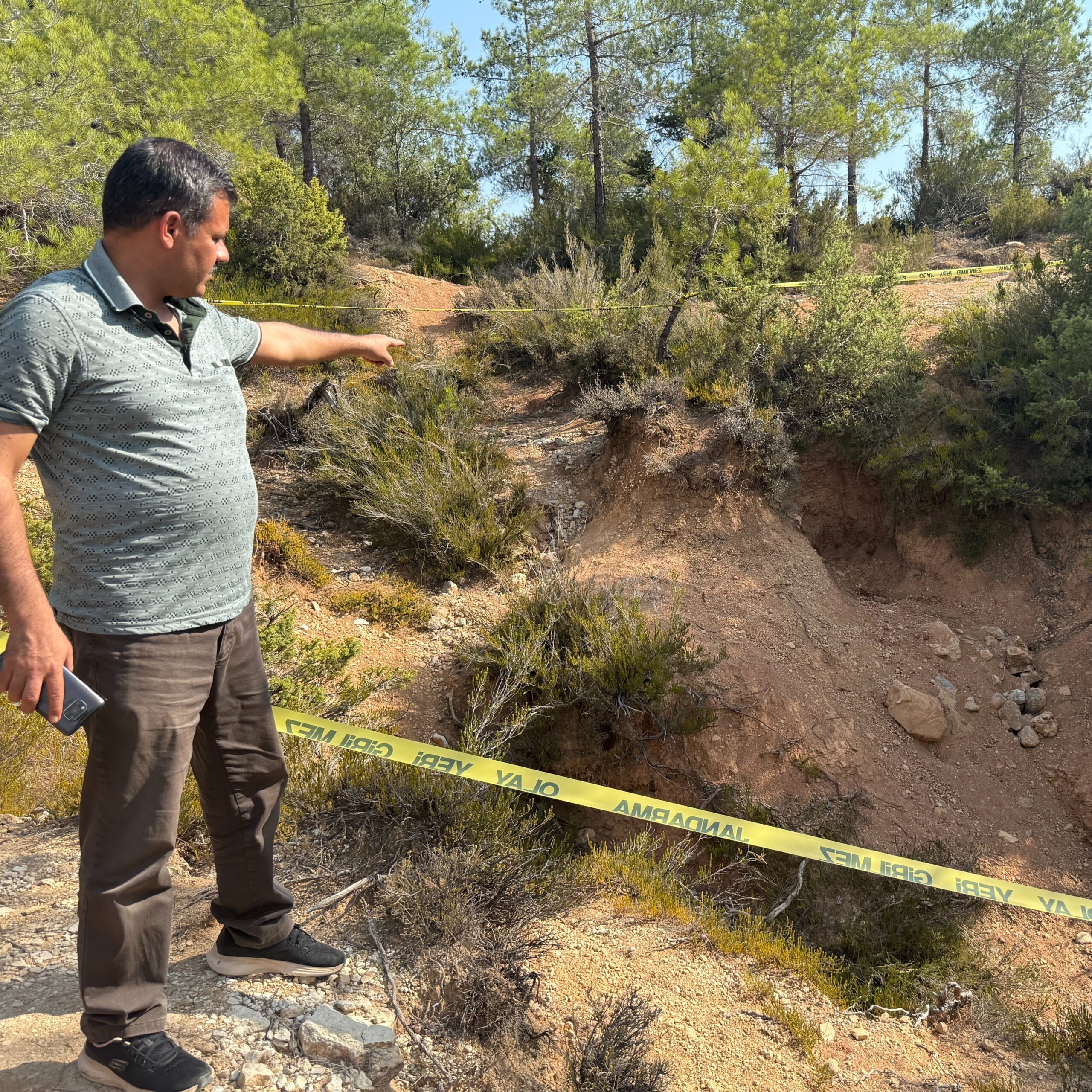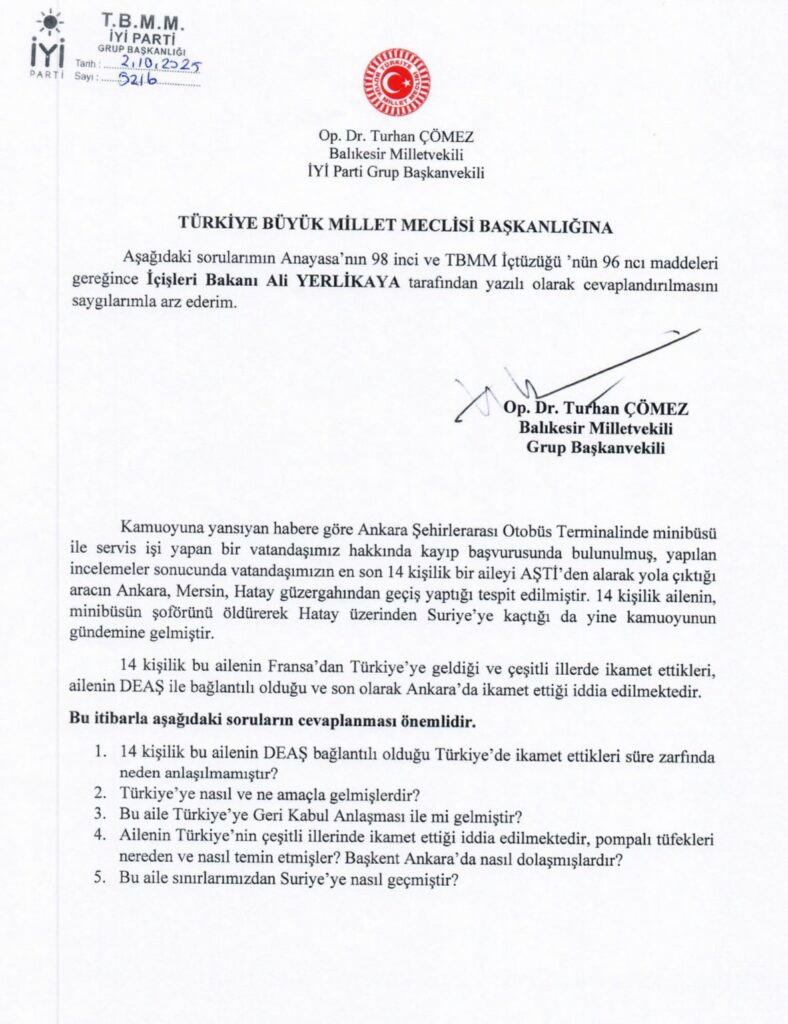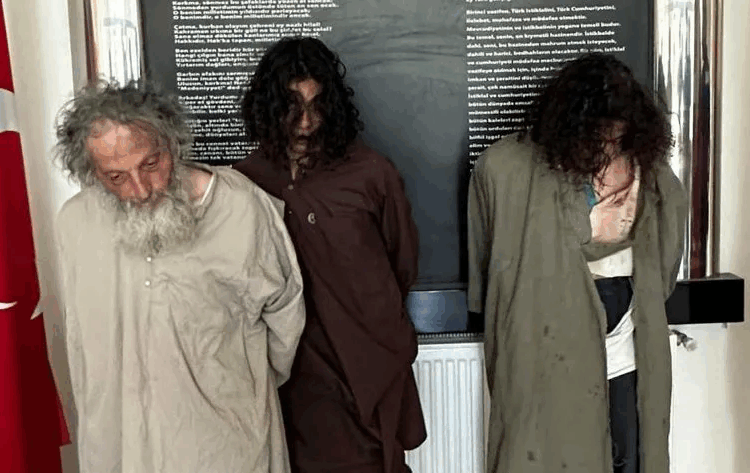Levent Kenez/Stockholm
The murder of a Turkish driver by a group linked to the Islamic State in Iraq and Syria (ISIS) has once again exposed how the extremist network continues to operate freely in Turkey despite government assurances that the group has been eradicated.
The killing of 65-year-old Binali Aslan is a chilling reminder that the threat of ISIS has not disappeared but rather has adapted, surviving through local sympathizers, porous borders and systemic intelligence failures.
According to the Interior Ministry, Aslan was abducted on September 21 while working at Ankara’s main intercity bus terminal, known as AŞTİ, and later found buried in a wooded area of Mersin about 480 kilometers away. Authorities said 14 members of a group identified as ISIS suspects were responsible for the murder and later fled to Syria. The ministry announced that eight members of the group were killed, two were injured and four were captured during a joint operation in Syria’s Idlib-Atme region coordinated with local security forces.
The group, known as the “Aksoy Family,” had reportedly lived in various Turkish cities including Gaziantep and Kayseri before settling temporarily in Ankara. Local media reported that the family had previously come under police scrutiny in Gaziantep after a violent altercation with gendarmes following a traffic accident in July 2025. They were jailed briefly and released. Near the shrine where they had been living, investigators later found the body of a 12-year-old disabled child, believed to be their relative, buried without official record.

Following Aslan’s disappearance, his family filed a missing persons report, but no immediate alert was issued to intercept the vehicle. Surveillance footage showed that Aslan’s minibus left Ankara and later appeared in Mersin and Hatay. When investigators tracked the route, the suspects had already crossed into Syria.
Government agencies have not provided further information about the group’s background or how it maintained connections to ISIS networks. Instead, most official statements focused on the nationality of the suspects and the details of the operation in Syria.
The opposition has described the case as a sign of deep institutional failure. Murat Bakan, deputy chair of the main opposition Republican People’s Party (CHP) responsible for internal affairs, said the incident revealed the “collapse of the state’s security system.” In a written statement he noted that the perpetrators, all Turkish nationals with known links to ISIS, had been able to live in Turkey, travel and cross the border without effective oversight. Bakan said the ministry’s statements focused narrowly on citizenship status while ignoring the operational failures that allowed the crime to occur.
Bakan called for an investigation into the intelligence process and coordination between the Interior Ministry, the National Intelligence Organization (MİT) and the gendarmerie. “This is not a simple criminal case,” he said. “A 65-year-old driver was kidnapped and killed by a group with known extremist connections. They traveled across multiple provinces and fled the country. This demonstrates a structural breakdown in state control.” He also demanded clarity on how many Turkish citizens are currently linked to ISIS, how many have returned from conflict zones and how many are being monitored.

Lawmaker Turhan Çömez also raised questions in parliament about the family’s background and possible state negligence. According to Çömez, the family had previously resided in France and was repatriated to Turkey under the EU–Turkey Readmission Agreement. He said the group was granted citizenship without adequate vetting and had been able to move freely around Turkey for years, Çömez wrote in his parliamentary statement. The Interior Ministry denied this claim, stating that all members of the family were Turkish citizens by birth.
In his inquiry Çömez asked whether Turkish intelligence was aware of the group’s movements before the murder and why the suspects’ names were not flagged in national databases. He also sought explanations regarding the group’s border crossing and whether any personnel were investigated for negligence.
The Interior Ministry has not responded publicly to those questions. Its official communication has emphasized the successful cross-border operation and the elimination of the suspects. State-aligned media outlets echoed the ministry, portraying the operation as a counterterrorism success.
Critics argue that the government’s handling of the case follows a familiar pattern: rapid dissemination of operational victories, limited transparency about procedural failures and minimal acknowledgment of domestic radicalization.
The case is a reminder that ISIS’s presence in Turkey has never entirely disappeared. In Ankara and other major cities, small clusters of groups once connected to the organization continue to live quietly. Some members are known to have returned from Syria or Iraq in recent years. The Aslan case, they say, shows that the threat has changed form but not vanished.
Turkey’s approach to handling ISIS suspects continues to raise concerns, as recent figures shared by Interior Minister Ali Yerlikaya suggest a persistent pattern of leniency toward members of the terrorist group. During a parliamentary briefing on November 20, 2024, Yerlikaya announced that between January 1 and November 1, Turkish law enforcement carried out 1,205 operations targeting ISIS, detaining 2,897 individuals. Of these, only 655 were arrested, while judicial supervision measures were imposed on 566 suspects. The remaining detainees were released without significant restrictions.

Nearly three-quarters of the individuals detained in these operations avoided pretrial detention, mirroring Turkey’s long-standing record of releasing most ISIS-linked suspects after limited legal procedures. The figures have fueled accusations that the government continues to pursue a “revolving door” policy, one that allows extremist suspects to re-enter society with minimal oversight and undermines public confidence in counterterrorism enforcement.
Nordic Monitor on Monday reported that Turkey’s deliberate practice of allowing ISIS detainees to choose their destinations after release, effectively enabling them to move freely and continue jihadist activities outside Turkey, continues to pose a significant security threat to Europe. The report cited a recent Dutch case in which the District Court of Rotterdam sentenced a 31-year-old Tajik national to five-and-a-half years in prison for long-term membership in ISIS, indicating how Turkey’s lenient policies have regional repercussions.












